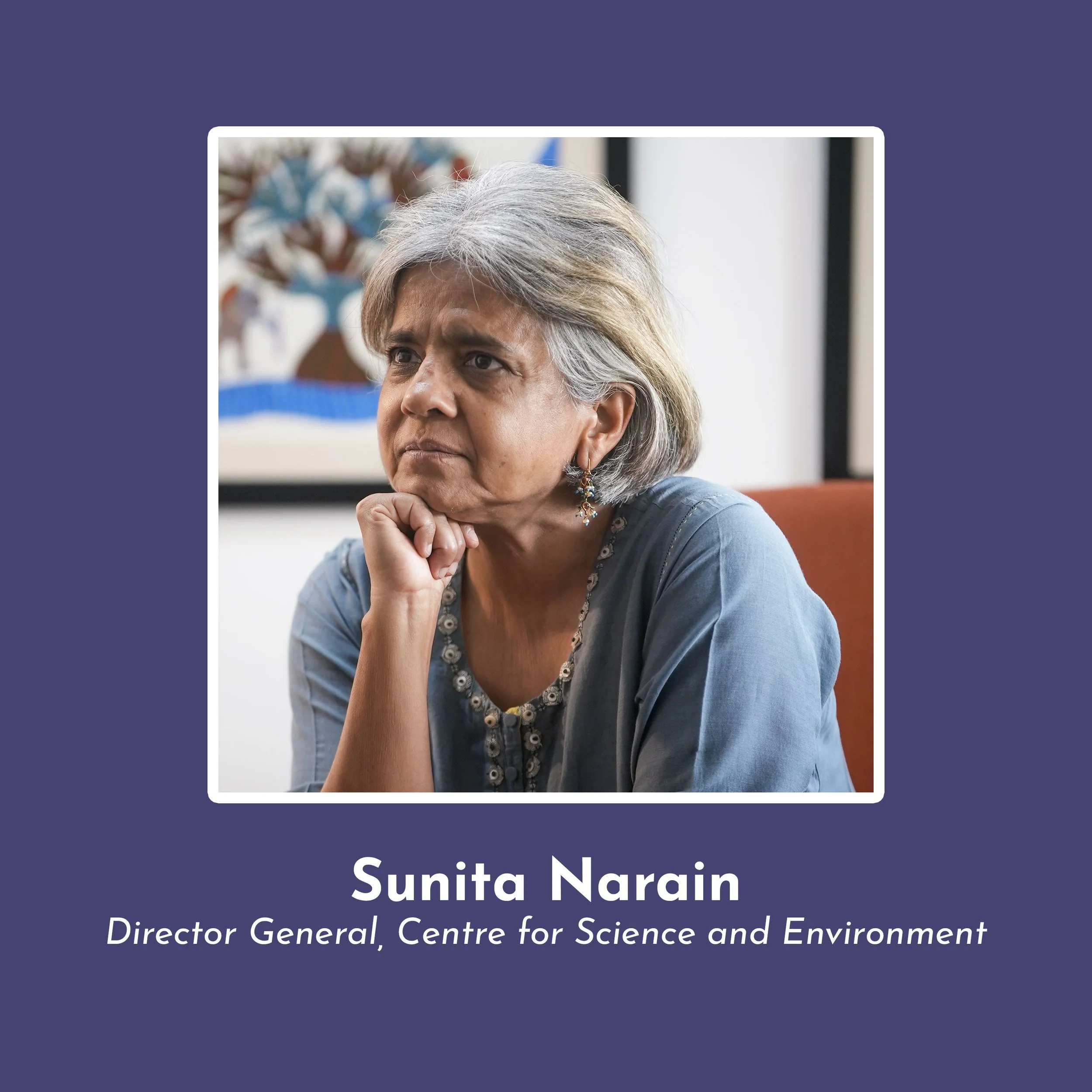Sunita Narain: “Reality and Perseverance in India: Pollution, Poverty, and Policy”
Episode 159
January 15th, 2025
(Conversation recorded on December 4th, 2024)
Show Summary
It is an unfortunate reality that the countries least responsible for the climate and ecological crises we face are often the ones most vulnerable to their effects today and in the future. India – with its population of 1.4 billion, rapidly rising temperatures, and limited resources compared to many developed nations – finds itself at the crossroads of these challenges. What do India’s leading scientists and advocates have to say about coping with these extreme pressures?
In this episode, Nate is joined by environmentalist and policy advocate Sunita Narain to discuss the intricate relationship between environmental issues and development, emphasizing the need for economically inclusive solutions. She highlights India’s challenges with sanitation, urban mobility, and climate change, while pushing for wiser approaches to governance and community planning.
How can the moral and cultural history of India combine with science and innovation to guide policy making decisions? Why does ‘sustainable development’ need to go beyond environmental considerations to include the economic availability for each nation’s poorest citizens? And perhaps most importantly, how could today’s challenges position India as a global leader in creating an economic system that prioritizes the health and well-being of all life on Earth?
About Sunita Narain
Sunita Narain has worked at the Centre for Science and Environment (CSE), a research and advocacy centre based in New Delhi, since 1982. She is currently Executive Director of the Centre, Treasurer of the Society for Environmental Communications and Editor of the bi-monthly magazine Down To Earth.
She is a writer and environmentalist who uses knowledge for change. In 2005, she was awarded the Padma Shri, the fourth-highest civilian award of the Republic of India. She has also received the World Water Prize for her work on rainwater harvesting and for her political influence in developing paradigms for community water management. In 2005, she also chaired the Tiger Task Force, at the request of the Prime Minister, to develop a conservation action plan for the country after the loss of the tigers in Sariska. Sunita Narain was a member of the Prime Minister's Council on Climate Change as well as the National Ganga River Basin Authority.
Show Notes & Links to Learn More
00:00 - Sunita Narain info, Centre for Science and Environment India, Down to Earth articles
03:21 - Butea Monosperma tree
06:30 - Article: we need politics of inclusion
06:44 - Book: Excreta Matters + introduction
07:34 - Waste to Worth: Managing India’s Urban Water Crisis through Wastewater Reuse
07:45 - Proportion of population with access to sewer connections in India
08:55 - Air pollution in Delhi, article: the clean air challenge
09:36 - Distribution of transport methods in Delhi
10:53 - India’s GDP growth
11:27 - Car ownership in the US
11:48 - Transport accounts for 21% of emissions
12:10 - Share of CO2 emissions by country
12:16 - Frequency of extreme weather events in India
15:27 - Rio conference 1992
16:58 - Heat stress at night in Delhi
21:12 - Non-sewered sanitation system in Odisha + national workshop on non-networked sanitation systems for India
23:49 - Article: old agenda with new imagination
23:53 - Mahatma Gandhi + the village republic
25:58 - Biological diversity in India
28:01 - Traditional water harvesting systems in India
29:29 - Ratan Tata + article on Ratan Tata
30:30 - Ambani wedding
33:26 - Emperor Ashoka + more info
37:26 - Declining fertility rate in India + by province
37:50 - Female literacy and fertility in India
38:02 - Female empowerment and education in Tamil Nadu
45:09 - Public views about science in India
45:52 - Government funding accounts for 60% of R&D spending in India
50:16 - Remaining carbon budget will be exhausted in the next decade
50:54 - Carbon inequality in 2030
51:50 - COP29 outcomes
52:59 - Climate risk projections India
54:46 - Climate-induced migration in India
55:47 - Economic Superorganism
58:04 - Union Budget’s focus on circularity in India
58:56 - Andrew Millison + TGS Episode, Paani foundation
1:00:04 - Natural farming in Andhra Pradesh
1:02:34 - Pesticides in Coca-Cola and Pepsi + impact of study
1:10:30 - Book: The Rise of the Neo-Locals
